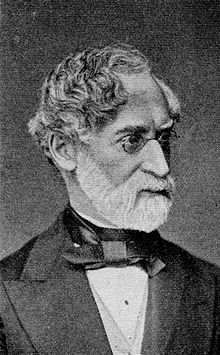Karl Müllenhoff
Karl Müllenhoff | |
|---|---|
 | |
| Born | 8 September 1818 |
| Died | 19 February 1884 (aged 65) |
| Nationality | German |
| Academic background | |
| Alma mater | |
| Academic advisors | |
| Influences | Jacob Grimm |
| Academic work | |
| Discipline | Germanic studies |
| Sub-discipline | German philology |
| Institutions |
|
| Notable students | |
| Main interests | |
Karl Viktor Müllenhoff (born September 8, 1818, in Marne, Duchy of Holstein; died February 19, 1884, in Berlin) was a German philologist who specialized in Germanic studies.
Biography
[edit]He was born in Marne, Holstein as the second son of merchant Johann Anton Müllenhoff. In his youth, he received his education in the town of Meldorf (1830–1837).[1] He later studied under Gregor Wilhelm Nitzsch at the University of Kiel, then continued his education at Leipzig (1839, under Gottfried Hermann and Moriz Haupt) and then in Berlin (1839-1841), where his instructors included Karl Lachmann and Wilhelm Grimm. In 1841 he received his PhD at Kiel with a dissertation on Sophocles.[2]
He taught classes in German language, literature and mythology at the University of Kiel, where in 1854 he became a full professor of German literature and history. Afterwards, he returned to Berlin as a professor of German philology (1858-1884). In 1861 he became a member of the Gesetzlose Gesellschaft zu Berlin. Two of his well-known students in Berlin were Wilhelm Scherer and Elias von Steinmeyer.[1][2]
In 1863 he introduced a theory involving the continuity of written language dating from the era of Old High German.[1]
From around 1875, he resided at Schellingstraße 7 (Berlin-Tiergarten), a few years later, moving to a house on Lützowufer in the same district. He was buried in the Alter St.-Matthäus-Kirchhof in Berlin-Schöneberg. In 1896, a thoroughfare called Müllenhoffstraße (Berlin-Kreuzberg) was named in his honor.[1]
Publications
[edit]- Sagen, Märchen und Lieder der herzogthümer Schleswig, Holstein und Lauenburg, 1845 – Collection of sagas, fairy tales and songs from the Duchies of Schleswig, Holstein and Lauenburg.
- De Antiquissima Germanorum Poesi Chorica, a treatise; cited as one of his greatest works (1847).
- Altdeutsche Sprachproben, 1864 (4th edition, 1885. 5th edition, 1963).
- Denkmäler deutscher Poesie und Prosa aus dem 8. bis 12. Jahrhundert, with Wilhelm Scherer (Berlin, 1864) – Monuments of German poetry and prose from the 8th-12th century.
- Deutsche Alterthumskunde, left unfinished; cited as one of his greatest works (1870–99); five volumes.
- Vol. 1. Die Phoenizier. Pytheas von Massalia.
- Vol. 2. Die Nord- und Ostnachbaren der Germanen. Die Gallier und Germanen.
- Vol. 3. Der Ursprung der Germanen.
- Vol. 4. Die Germania des Tacitus.
- Vol. 5. Über die Voluspa. Über die ältere Edda.[3]
Notes
[edit]- ^ a b c d "Statement(s) based on translated text from an equivalent article at the German Wikipedia".
- ^ a b biography @ NDB/ADB Deutsche Biographie
- ^ WorldCat Identities Most widely held works by K.Müllenhoff
References
[edit]- Ripley, George; Dana, Charles A., eds. (1879). . The American Cyclopædia.
- This article incorporates text from a publication now in the public domain: Gilman, D. C.; Peck, H. T.; Colby, F. M., eds. (1905). . New International Encyclopedia (1st ed.). New York: Dodd, Mead.
Further reading
[edit]- Scherer and Schröder, Karl Müllenhoff (Berlin, 1896) (in German)
External links
[edit]- Works by or about Karl Müllenhoff at the Internet Archive
- Works by Karl Müllenhoff at LibriVox (public domain audiobooks)

- Works by Karl Müllenhoff at LibriVox (public domain audiobooks)

- 1818 births
- 1884 deaths
- People from Dithmarschen
- German philologists
- Germanic studies scholars
- People from the Duchy of Holstein
- University of Kiel alumni
- Leipzig University alumni
- Humboldt University of Berlin alumni
- Academic staff of the University of Kiel
- Academic staff of the Humboldt University of Berlin
- German academic biography stubs
